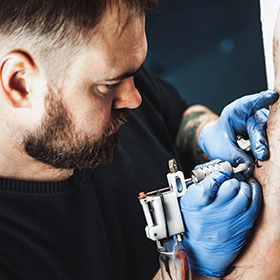Yes, an anemic person can get a tattoo, but precautions are necessary. It’s crucial to understand the risks and consult a doctor first.
Anemia is a condition where your blood lacks enough healthy red blood cells. This can lead to fatigue, weakness, and other health issues. For those with anemia considering a tattoo, it’s essential to know the potential impacts. Tattoos involve needles and ink, which can stress the body.
An anemic person might have slower healing and increased risk of infection. Consulting with a healthcare provider ensures you understand your specific health situation. They can give advice tailored to your needs. Knowing the facts helps you make a safe decision. Keep reading to learn more about getting a tattoo with anemia and steps to take for safety.
Introduction To Anemia
Anemia is a condition where the body lacks enough healthy red blood cells. These cells carry oxygen to different parts of the body. Without enough red blood cells, your body might feel tired and weak. Iron deficiency is a common cause of anemia. Other causes include vitamin B12 deficiency, chronic diseases, and genetic conditions. Anemia can affect people of all ages. It is important to diagnose and treat anemia early to avoid complications.
People with anemia often feel tired and weak. They may have pale skin and cold hands or feet. Shortness of breath and dizziness are also common symptoms. Some people experience chest pain and headaches. Brittle nails and hair loss can occur. Anemic individuals might find it hard to concentrate. These symptoms can vary depending on the type and severity of anemia. Regular check-ups can help detect anemia early.
Tattooing Process
Tattoos are made by inserting ink into the skin. A needle pricks the skin many times. Each prick places a small drop of ink. The ink goes into the second layer of skin. This layer is called the dermis. It helps the tattoo stay permanent.
There are some risks with tattoos. Infections can happen if the tools are not clean. Allergic reactions to the ink are also possible. Sometimes, the skin swells or gets red. Scarring can occur if the skin does not heal well. It’s important to follow care instructions.
Health Risks For Anemic Individuals
Anemic people have less iron in their blood. This means they may bleed more during a tattoo. Tattoos involve needles that go into the skin. More bleeding can make the tattoo process harder. It can also take longer to finish the tattoo.
Healing is slower for those with anemia. Their bodies need more time to repair. A new tattoo is like a small wound. It needs to heal well to look good. Slow healing can cause infections and scarring. It might also affect the final look of the tattoo.
Consulting A Healthcare Professional
Medical advice is very important for anemic people. Anemia can cause low iron levels in the blood. This can affect healing and immune response. A healthcare professional can evaluate your condition. They can advise if it is safe to get a tattoo. Ignoring this step can lead to complications.
Blood tests are crucial before getting a tattoo. These tests can check iron levels and red blood cell counts. Knowing these numbers helps in planning a safe tattoo session. It’s also good to check for infections. Some infections may worsen with a tattoo. Always share complete health history with your doctor.
Precautions Before Getting A Tattoo
Pick a clean and reputable tattoo parlor. Check for professional certifications and health standards. Observe the artist’s hygiene practices. Ensure sterilized equipment is used. Ask about their aftercare instructions. This ensures your safety and health.
Maintain a balanced diet before getting a tattoo. Eat foods rich in iron and vitamins. Drink plenty of water to stay hydrated. This helps your body heal faster. Avoid alcohol and caffeine before your appointment. These can dehydrate your body.
During The Tattoo Session
Tell your tattoo artist about your anemia. This helps them take care. They can give breaks if you feel dizzy. Bring snacks and water. Stay hydrated and keep your energy up. Ask questions if you feel unsure. Trust between you and the artist is key. Speak up if you feel unwell. They are there to help you. Always be honest about your health.
Feel lightheaded or dizzy? Tell your artist right away. Nausea or sweating is a sign too. Do not ignore these feelings. They may be serious. Keep an eye on your breathing. If it becomes hard, say something. Quick action can prevent problems. Your safety comes first. Listen to your body. It knows best.
Post-tattoo Care
Keep the tattoo clean and dry. Wash gently with mild soap. Pat dry with a clean towel. Apply a thin layer of fragrance-free moisturizer. Avoid direct sunlight on the tattoo. Do not scratch or pick at the scabs. Wear loose clothing to prevent irritation. Stay hydrated and eat well.
Watch for signs of infection like redness or swelling. Seek medical help if you notice pus or severe pain. Allergic reactions are rare but possible. Look out for unusual itching or rashes. If you feel feverish, contact a doctor. Always follow the tattoo artist’s advice for the best results.
Alternative Body Art Options
Henna tattoos can be a safe choice. They use natural dye from plants. It does not hurt the skin. This is a great option for those who cannot get a real tattoo. Henna designs can last for a few weeks. They fade away slowly. You can change the design often.
Temporary tattoos are another fun option. They can be applied easily with water. No needles needed. They last for a few days or weeks. You can choose from many designs. This is good for those who want a tattoo look without the pain. You can remove them easily with soap and water.
Conclusion
Deciding on a tattoo with anemia requires careful thought and consultation. Talk to your doctor first. Ensure your anemia is well-managed. Choose a reputable tattoo artist. Follow aftercare instructions strictly. This helps avoid complications. Always prioritize your health. A thoughtful approach can ensure a safe and satisfying tattoo experience.

